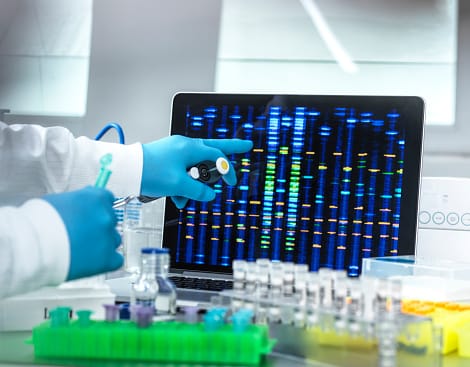Ever wondered why you’re not supposed to take antibiotics on an empty stomach? Here’s a closer look at how antibiotics function and how genetic testing can help optimize your treatment.
In 2016, over 270 million antibiotic prescriptions were written by doctors in the United States. Used to relieve and prevent bacterial infections, antibiotics are considered an instrumental part of many treatment plans. Of course, in order for these drugs to be effective, it’s important that they’re used properly.
Following prescription instructions is key to ensuring that the drug works as planned. For example, taking medication on an empty stomach may be required in order for the drug to function. However, in some cases, you may follow your instructions to the dot and discover that the medication doesn’t work as it’s supposed to. What do you do then?
At ClarityX, we offer a DNA test that can help predict your body’s response to certain drugs and optimize your treatment plan. Here’s some more information on when you should (and shouldn’t) take medication on an empty stomach and the pivotal role DNA testing plays in your treatment.
What Are Antibiotics?
Before we examine what happens if you take antibiotics on an empty stomach, it’s important to review what antibiotics do. Usually, the immune system is responsible for protecting your body from bacteria. However, in some cases, your immune system may be unable to effectively fight bacteria (such as if the amount of bacteria is excessive). That’s where antibiotics come in.
In short, antibiotics help reduce the risk of infections by preventing the growth and reproduction of harmful bacteria. Some examples of antibiotics include:
- Penicillins
- Cephalosporins
- Aminoglycosides
Some topical antibiotics, such as creams and ointments, are available for over-the-counter (OTC) use — most, however, are only accessible through a prescription. When prescribed antibiotics, it’s essential that you follow your doctor’s guidance on whether you should or shouldn’t take medicine on an empty stomach.
Should I Be Taking Antibiotics On An Empty Stomach?
A common question that arises when someone is prescribed a new medication is, “how long after eating should I wait before taking it?” In other words, should you wait several hours or just take your medication directly with food? The question of whether or not you should be taking pills on an empty stomach depends on the type of medication you’re on.
For some drugs, it’s advisable to take them with food because the physiological changes that occur in your body create an ideal environment for the absorption of the medication. For instance, you might be told to have acidic food or drinks (such as soda) if your medication requires an acidic environment.
In other cases, however, you may be advised to take your medication or antibiotics on an empty stomach. For example, an antibiotic called penicillin V (a type of penicillin) should only be taken on an empty stomach as it becomes less effective when exposed to acidic conditions.
Taking Medication On An Empty Stomach: Side Effects
Generally, if you are instructed to take your antibiotics on an empty stomach, then that means avoiding food with your medication creates the optimal environment for drug absorption. However, when introducing a new drug to your system, there’s always the chance of adverse effects. These may include:
- Vomiting
- Nausea
- Bloating
- Abdominal pain
- Loss of appetite
It’s normal to experience a few side effects when you begin your antibiotics. However, if these effects do not go away, or if they’re so debilitating that they render your treatment ineffective, then it may be time to switch to new antibiotics.
What Happens If Your Antibiotics Aren't Working?
If your antibiotics are not working properly, and you are following the given instructions, then your doctor may do one of two things:
- Change your dosage
- Switch your medication
In some cases, the problem can be resolved by simply changing your dosage. If you are experiencing too many side effects, your doctor may lower your dosage — conversely, if the antibiotic is simply ineffective, they may increase your dosage. If this doesn’t work, then the problem may be related to the actual medication itself, in which case it will need to be switched.
The latter option requires a time-consuming, taxing game of trial and error which involves your doctor prescribing different medications until they find one that works with your body. Although this treatment process may seem frustrating, there is a solution available: genetic testing.
What Is Genetic Testing for Antibiotics?
Genetic testing, or pharmacogenetics, is a medical field that analyzes the information present in your DNA. Every DNA molecule features genetic material that builds enzymes, a protein used to metabolize medication. If your enzymes metabolize too slowly, the drug remains in your system and causes unpleasant side effects. On the flip side, if they metabolize too quickly, then the drug is broken down before it has the chance to be effective.
By examining your genes, researchers can uncover variations that are known to affect the metabolism rates of enzymes. Most tests focus on an enzyme family called cytochrome P450, which is responsible for metabolizing between 70% and 80% of clinically used drugs. Whether you are trying to find a new treatment due to a recent diagnosis or ineffective current medication, genetic testing can help you discover a drug that works for you.
ClarityX: Get A DNA Test Done Today
It’s one thing for your medication to not work because you failed to follow the instructions (such as if you don’t take your pills on an empty stomach when you’re supposed to). It’s another thing to follow the instructions perfectly and still have your medication ineffective. If this happens, then you may have a genetic variation that is interfering with your ability to break down drugs.
At ClarityX, we offer DNA testing that can predict your response to over 265 FDA-approved drugs. All that is required is a simple saliva collection (which can be taken in the comfort of your home). Not only will we advise you on which medications (or combination of medications) you should avoid, but we can also tell you if you need to increase or decrease your current antibiotic dosage. Learn more about your body by getting a DNA test today!





